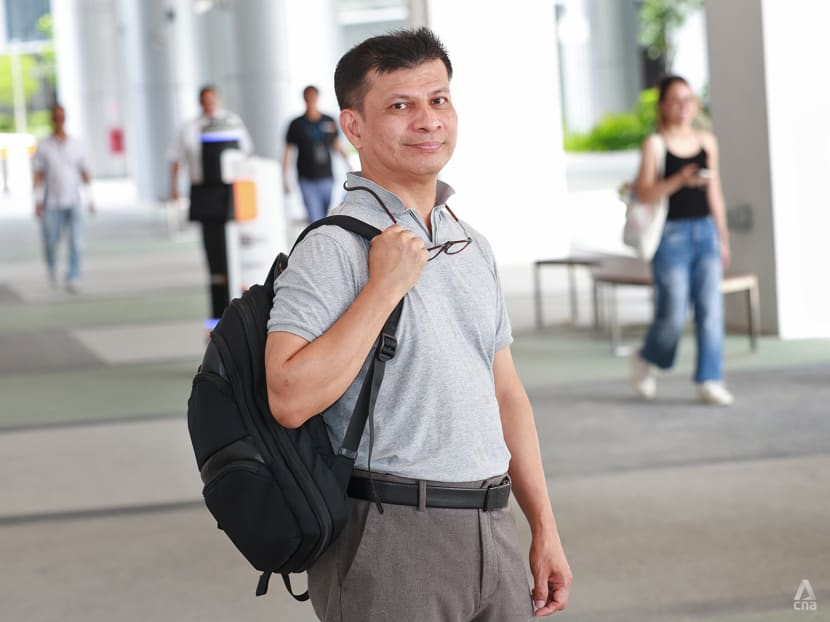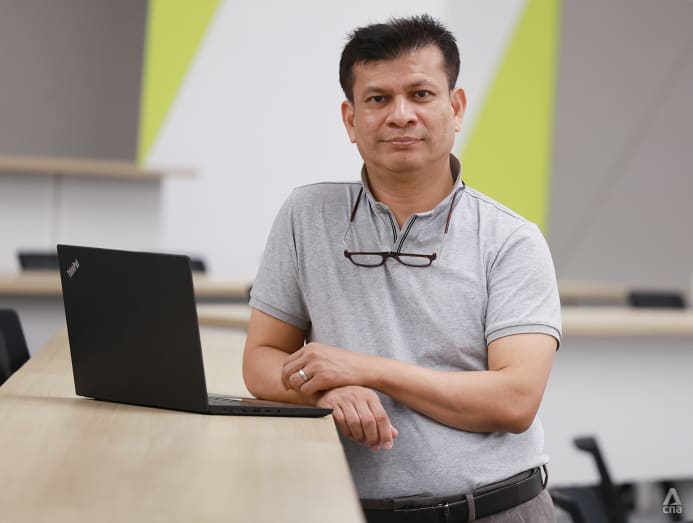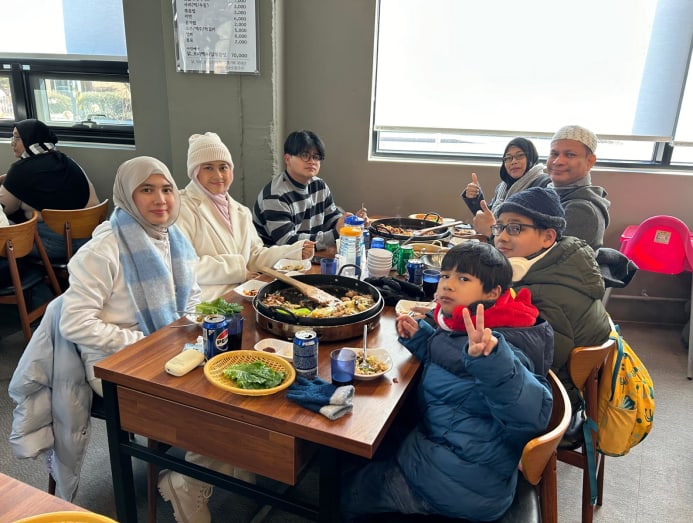In 2018, I lost my IT job and thought I’d never be in tech again. Now I teach AI to students and adult learners
Mr Yatim Ghani was the head of IT in a firm until he was made redundant with no warning. With his family's support, here's how he eventually picked himself back up again.

Mr Yatim Ghani never thought he'd end up teaching subjects like artificial intelligence and Internet of Things. (Photo: CNA/Raj Nadarajan)

This audio is generated by an AI tool.
In late 2018, I was the head of IT in a firm I had dedicated many years of my life to. One afternoon, I was called into a meeting, handed an envelope, and told that my role had been made redundant. Just like that, 18 years of hard work, late nights and quiet sacrifices went up in smoke.
The first thing I did was call my wife. She didn’t say much, just “Come home first. We’ll figure it out.”
Her words grounded me in that moment. Because truthfully, my mind was completely blank – I had no idea what to do next.
For the next three years, I felt like I was floating. Life became a meaningless blur of job applications sent into the void, polite rejections, and radio silence.
With bills to pay, I became a Grab driver. It was honest work, and I came to appreciate the structure of the routine and the small human moments in picking up a sleepy executive at 6am or chatting with retirees on the way to the clinic.
And then COVID-19 hit. Almost overnight, the roads emptied. My bookings dropped to a trickle; sometimes I’d wait 40 minutes for a single ride. I drove 10-12 hours each day and barely made enough to cover petrol, let alone meals, utilities, and my family’s other needs. Still, every single dollar mattered.
Behind the wheel, I fought not just physical exhaustion , but doubt. How long could I keep going like this? I carried my burdens with clenched teeth and silent prayers, but they only seemed to be growing heavier each day.
For three years, I was running on empty both physically and emotionally. I asked myself over and over: “Yatim, is this what you have become?”
CHOOSING TO BELIEVE
One night, tired from hours of driving with little reward, I came across the SGUnited Skills programme on my phone. My gaze caught on a course on smart factory and data engineering at the Singapore Institute of Technology (SIT). The course description was peppered with words like “Internet of Things” (or IoT), “automation systems” and “data integration” – all topics that had been mere emerging buzzwords when I was last working in IT.
In that moment, I had a painful realisation: I had spent nearly two decades in tech, leading teams and building solutions that once felt cutting-edge – but all those years of experience meant little the moment I stopped learning.
I had let my industry move on without me. I had become outdated. Obsolete.
I missed the spark I once had. I missed feeling relevant and having something to offer.
A small flame of faith fanned within me: Maybe it wasn’t too late. Maybe I still had it in me to grow.
With a deep, trembling breath, I clicked “enrol”.
FINDING PURPOSE AGAIN
Relearning at nearly 50 wasn’t easy. I had to set aside my age and industry experience and return to the basics – not just in skills, but in confidence.
But I was pleased to discover that SIT’s eight-month course was structured thoughtfully to help all kinds of learners not just acquire technical knowledge and skills, but also apply them meaningfully. Through hands-on projects in areas like artificial intelligence (AI) and digital transformation, I began seeing how today’s digital economy has evolved to create a need for different types of expertise.

The teaching staff at SIT were experts but also patient, passionate mentors who believed in every learner’s potential. With their encouragement and support, for the first time in years, I felt it was okay to ask questions, stumble and start over.
The course didn’t just deliver education; it delivered a renewed sense of purpose for me.
RESKILLING ISN’T JUST ABOUT ME
People often talk about reskilling or upskilling as a journey of personal growth. For me, it was never just personal.
Through my years of redundancy, my wife held our household together with quiet strength, taking care of our five children while I was out driving long hours or buried in assignments.
When I first enrolled in SIT, my kids – the youngest of whom was just six years old – didn’t understand why Dad was suddenly home all the time. But once we explained I was “back in school”, they never failed to ask me at the end of each day: “Daddy, how was class!”
Truth be told, there were many moments where I wanted to quit. Moments where I felt too old, too slow – unsure if I could keep up.
But on those doubtful, defeated nights, my wife would gently remind me why I started. We had many honest conversations about expenses, sacrifices, and the kind of example I wanted to set for our children.
I knew that I wasn’t just rebuilding myself. We were, as a family, rebuilding what our life could look like together.

FROM LEARNING TO TEACHING
When I started the SIT course, I wasn’t sure where it would lead. But over time, I found myself thinking often about my past experiences mentoring younger colleagues as a department head, or hearing passengers’ personal stories as a private-hire driver.
I began to see that the true value in my reskilling journey was no longer about gaining knowledge. If I was serious about re-entering the tech field, I had to find a new path – one centred on connecting with and investing in people.
Upon graduating, I started consulting to regain my footing in an industry that had changed so much. I had to rebuild my confidence in my abilities to both solve problems and work in tandem with others.
Soon, though, I realised that it wasn’t enough for me to grow. I wanted to help others grow, too.
Eventually, I found myself back in the classroom, this time as an educator at a private Institute of Higher Learning.
My first day in the job, standing before my first class was a profound moment for me. I used to think of AI and IoT as things that were out of my reach – now I was educating others on them. I had rebuilt myself – now I was helping others do the same.
TO FALL IS HUMAN
If you’re feeling stuck, unsure or afraid right now, I want you to know that it’s okay to fall. We all do – that’s just life. What matters is what you do after the fall.
Saying yes to re-education wasn’t easy. It was uncomfortable, humbling and exhausting. But on our hardest days, there’s a quiet strength that only comes from knowing someone who loves you is waiting for you at the end. My family’s belief in me was strong and steadfast – and that made all the difference.
Our true value as human beings is not in our title or pay cheque. We can always learn new ways to grow and contribute.
And sometimes, the very thing that knocks you down can become the push you need to stand taller than you ever did before.
Yatim Ghani is an adjunct lecturer in IoT and AI, as well as an advocate for mid-career upskilling and digital resilience.
If you have an experience to share or know someone who wishes to contribute to this series, write to voices [at] mediacorp.com.sg with your full name, address and phone number.










